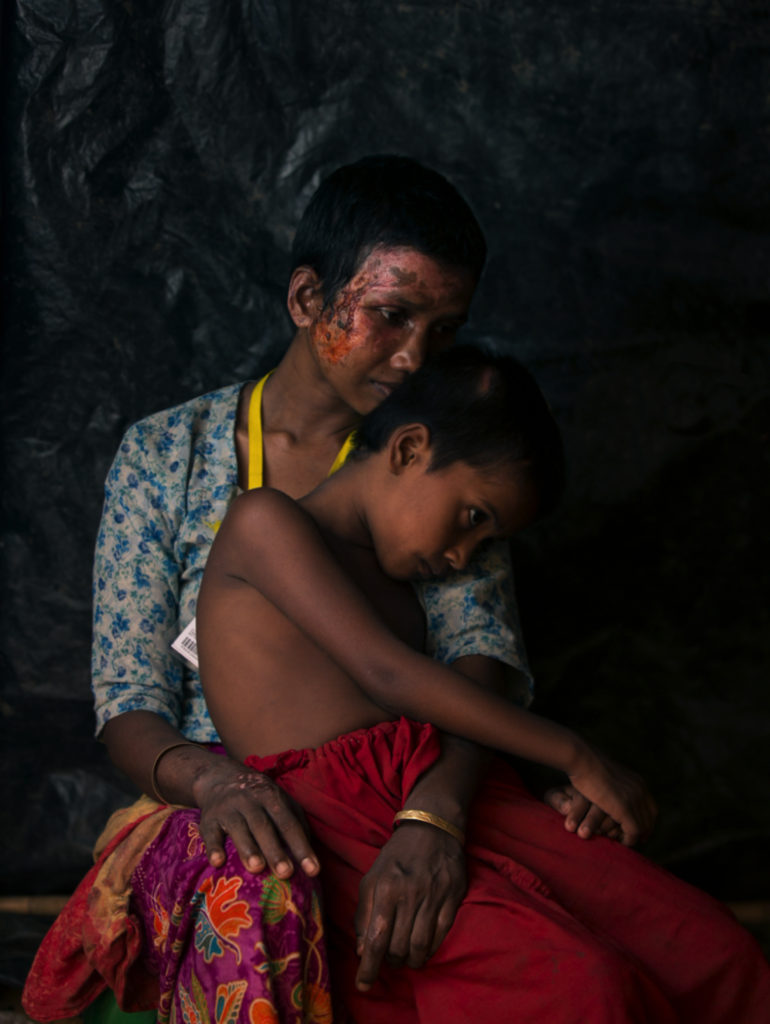Night Without End
By Laila Waheed | Special Report | Published 8 years ago
A report from the Rohingya camp, Cox’s Bazaar, Bangladesh.
Photos by Hannah Raja for One Million Voices Rising. Hannah spent months in the camps compiling the women’s stories. She is now in the process of making a documentary.
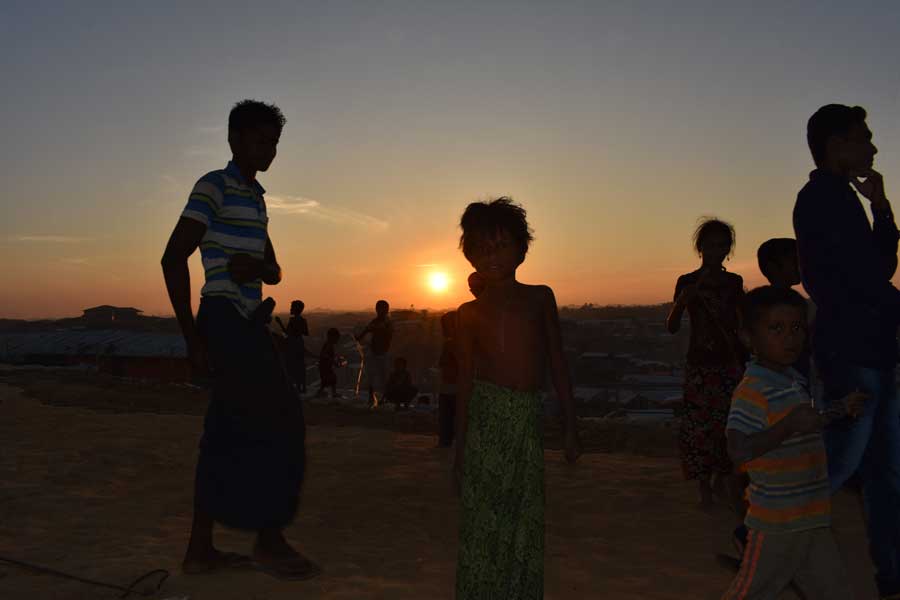 The United Nations’ Human Rights Watch has referred to it as ‘ethnic cleansing,’ and according to other assorted UN reports it has been termed a “human nightmare,” “an unfolding genocide” and “the world’s fastest developing refugee emergency.” While there have been crackdowns by the junta in Myanmar on Rohingyas throughout the last few decades, dating back to 1978, this one is unprecedented in scale. Even with the current global backdrop of terrorism, wars, famine and natural disasters, this is a human calamity perhaps unparalleled in bestiality in recent times.
The United Nations’ Human Rights Watch has referred to it as ‘ethnic cleansing,’ and according to other assorted UN reports it has been termed a “human nightmare,” “an unfolding genocide” and “the world’s fastest developing refugee emergency.” While there have been crackdowns by the junta in Myanmar on Rohingyas throughout the last few decades, dating back to 1978, this one is unprecedented in scale. Even with the current global backdrop of terrorism, wars, famine and natural disasters, this is a human calamity perhaps unparalleled in bestiality in recent times.
Subsequently, according to Medecins Sans Frontieres, 640,000 Rohingyas have fled Rakhine — the epicentre of the violence — since August 2017, and have taken sanctuary in Bangladesh, adding to the 300,000 refugees that had earlier made it to the camps there.
I am in the Rohingya refugee camps near Cox’s Bazaar, when word spreads that Pope Francis, on a trip to the East, is on his way to the camps. In anticipation, crowds start to throng the area, causing huge traffic jams. But the Pope never makes it — instead we learn, he has travelled to Myanmar. Known for his vocal condemnation of injustice against the downtrodden, that elicits the expectation that he will take up the issue of the Rohingya genocide and their forcible expulsion, with the authorities in Myanmar. But that too does not happen. Pope Francis remains uncharacteristically silent on the issue through his trip in Myanmar, and does not, quite pointedly, use the word “Rohingya” even once. Is that because the Myanmar government has stopped recognising the term ‘Rohingya,’ one wonders.
However, that was then and there. Later in the week, in the Bangladesh capital, Dhaka, the Pope addressed a large interfaith gathering for peace, comprising Christians, Buddhists, Hindus, Muslims and a token group of 16 Rohingya survivors of the holocaust in Myanmar. The group comprised 12 men, two women and two young girls. “We won’t close our hearts or look away,” said the Pope. “The presence of God today is also called Rohingya.” And he vowed to continue raising the Rohingya issue, “so that their rights become recognised.” At this gathering, the enormity of the tragedy clearly appeared to weigh heavily on him, and he prayed “for the indifference of the world, above all, I ask for forgiveness.” But he did not address his own silence when he was in Myanmar.
The term ‘Rohingya’ comes from ‘Rakhanga’ or ‘Roshanga,’ meaning ‘inhabitant of Rohang,’ the early Muslim name for Arakan. Andrew Tan contends the word comes from Raham, and speculates that early Muslims in Arakan referred to themselves as “God’s blessed people.” The Classical Journal of 1811 identified ‘Roooinga’ as one of the languages spoken in the ‘Burmah Empire.’ The Rohingya maintain they are indigenous to western Myanmar, with Arab, Mughal and Portuguese influence. Recorded history testifies that Arab merchants had been in contact with the Arakan since the 3rd century, and Arab traders are also recorded in the coastal areas of southeast Bengal, bordering Arakan, since the 9th century, the Rohingya population tracing their history to this period.
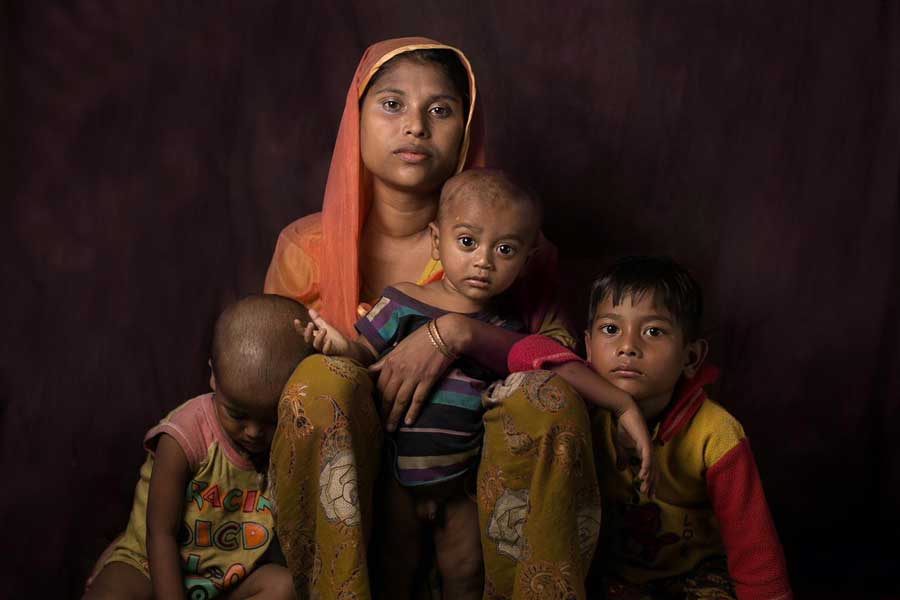
Portrait of a family ravaged.
In the past the Rohingyas were recognised as an indigenous ethnic nationality of Burma, with members of the community serving as representatives of parliament, ministers, parliamentary secretaries and other high- ranking government positions. However, in 1962 the Burmese military junta took control of the country and proceeded to systematically deprive them of their political rights. Under the 1982 National Law, the Rohingyas were even denied citizenship. Today Myanmar law does not recognise the ethnic minority as one of the eight “national races” in the country.
Although in many of the camps in Cox’s Bazaar women and children outnumber men — the male members of their families having been mowed down — in the Kuthupuli camp I met a number of male survivors. One of the older men I was introduced to, Nazir Ahmed, spoke impeccable Urdu. He informed me he had been chairman of a village of 7,000 plus. Then one day, he said, the Rohingyas were informed their identity cards were being recalled and they would be issued new ones soon. Instead, they realised no new cards — without which they could not even shop for necessities — were forthcoming. They had to resort to bribing military guards to buy them groceries — this with money secreted away, because if anyone among them was found having money, he/she would be in danger of, at best, being fined the equivalent of 6000 taka, or having the money confiscated, or worse, being jailed and tortured. The Rohingyas plight continued to worsen. Other men in the camp told me how their freedom of movement, state education and civil service jobs had slowly been restricted. The older men, most of whom had a good knowledge of Islam and read the Quran with meaning and good pronunciation, had Bachelors’ degrees or beyond. A lot even spoke Urdu fluently. Those a few years younger, had made it to the first year of college, those younger than them had not been permitted to study beyond high school. And finally, I was informed, Rohingya children were no longer allowed to go to school at all. The only education option left for the children, the men said, were madrassas connected to the masjids in the area.
Then began the genocide. First the Rohingyas’ livestock was slaughtered and their houses burnt. This was followed by a wholescale massacre of the Rohingyas themselves, forcing those that managed to survive to escape through the jungle and cross the river Naf, itself red with blood and floating human carcasses.
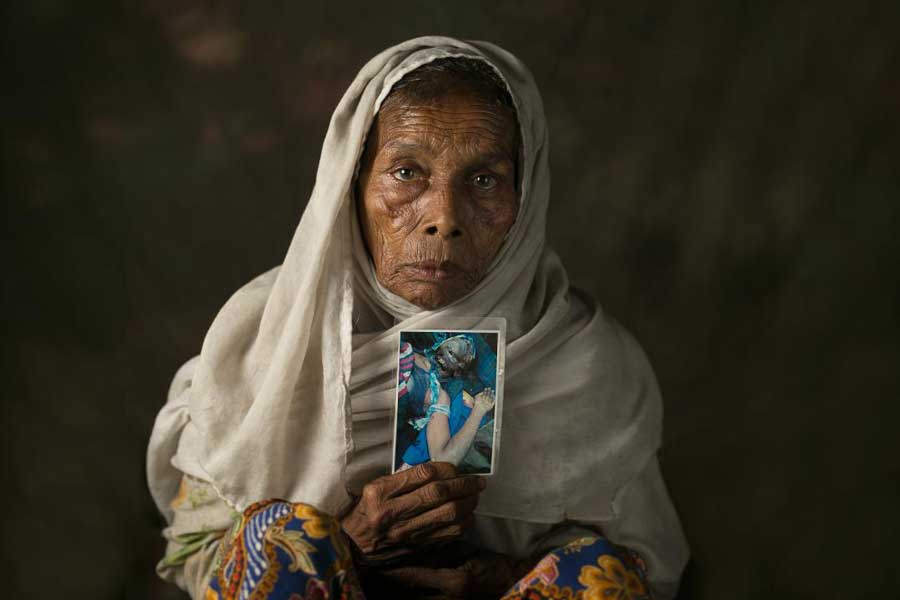
“My son was the chief of our village in Rakhine state. He was a good man who looked out for everyone he knew. My heart weeps for my son, his wife and their children. What was his wrong that his life had to end this way? What was our wrong that we had to flee our home and are in this camp with no hope and no future for our children? No mother should have to bury her own child.”
In the camps there is an outbreak of diphtheria, fast growing into an epidemic. Measles and a number of Aids cases have also been reported. I was told the World Health Organisation (WHO) and the United Nations Human Rights Commission (UNHCR) were planning to vaccinate 250,000 children, but it may already be too late. And despite the commendable efforts of Bangladeshi and foreign NGOs and the army, conditions in the camps leave a lot to be desired. While independent volunteers have come to Cox’s Bazaar on their own volition and joined local relief organisations — among them, Obat Helpers, a truly inspirational group of young people from all over the world — there is still a dire need for medical personnel: doctors, nurses, pharmacists and also mental health workers. Dr Zaid Hamoodi, of Obat Helpers, has put out a desperate personal appeal on Facebook. I am told that although the refugees put up a brave face all day, when the camps empty of all aid personnel at dusk, cries of distress and the wailing of women resound.
In November, Myanmar and Bangladesh signed a memorandum of understanding for the repatriation of the Rohingyas. I was in the camps that day and there was general dismay among the refugees. “It would be better to kill us all here than to send us back to be slaughtered, burnt, tortured and raped,” said one woman — a refrain echoed by many others as they repeated their stories again and again, of men clad in military uniforms coming early in the morning, interrupting families eating breakfast and unleashing unimaginable horror… babies being tossed in the air and beheaded; men being shot or butchered by knives and machetes in the presence of their wives, mothers, children; young girls and women being taken away, gang-raped, and then having their throats slit; the locked huts — where their corpses and some of the living were confined, being set aflame; mothers on fire, begging their stunned, terrorised, children to run for their lives while they themselves were consumed by flames.
The camps are full of young orphans, those whose lives were somehow spared, but they are lives traumatised by visions of their families being slaughtered, mutilated, burnt.
Examining the uniformity and precision of the degradation and genocide of the Rohingyas by the primarily Buddhist military, and also some Buddhist monks, a distinct method to this madness emerges. The Rohingyas made up a majority — in the range of 80-98 per cent — of the population of Rakhine state. They were farmers holding vast acres of fertile land with varying degrees of affluence, many of them livestock, car and home owners. On an average, Rohingya families comprised 4-5 children each, 46 per cent more than the national average. Since the 2016/17 military crackdown began, 900,000 are said to have fled, primarily to Bangladesh, but also to other countries in the vicinity. In Karachi, for example, there is a large Rohingya community from an earlier exodus, living in squalid conditions.
For the uneducated, displaced, war-ravaged women and children in the camps, another danger looms. “Life and living on the edge has not erased the delicate beauty of the Rohingya women,” said Rebecca Haque, professor of English at the University of Dhaka. The Rohingyas, expendable to the rest of the world, are still seen as profitable by the criminal underworld. Lured away by cheap candy and maybe a nice place to live, children easily disappear and whispers of human trafficking and prostitution are already reverberating on the social and electronic media.
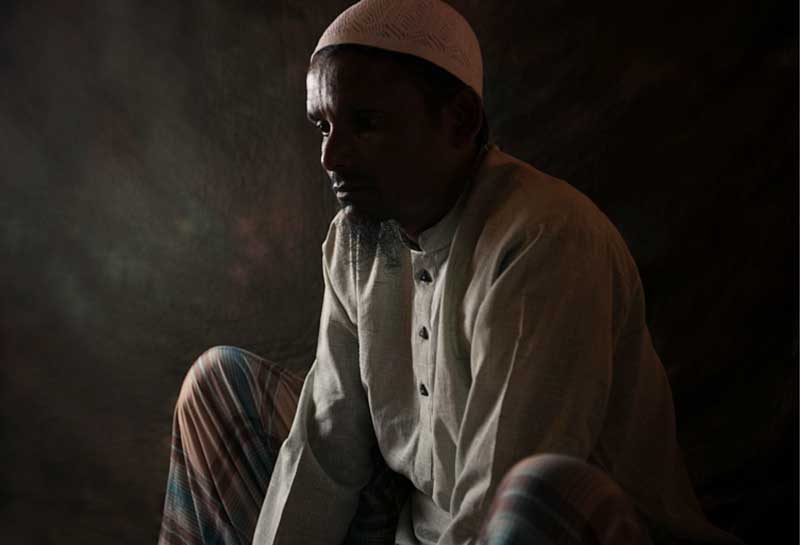
“My wife’s name was Laila Begum. My daughter’s name was Noor Halimah. My son’s name was Saifullah. My daughter’s name was Tohidah Begum. My other daughter was Ummal Hafsah. My other son was Jahidur Rahman. I want justice for my family who were all taken from me. I have nothing left.”
In the Theinkali camp I visited a child health centre set up by a wonderful Bengali lady, Mehereen. Walking from the main road into the camp we managed to attract a gaggle of children, among them Rizwana. She is a beautiful little girl who followed at a distance, hanging back and turning away every time I turned to look. If I beckoned, and I did a lot, she would shyly fall back. We got to the “orphan-friendly area” where all the neighbourhood children come to play every morning, and I finally got to meet Rizwana. The younger children and babies played and sang in a shed with a lovely volunteer from Australia and the older boys played games of volleyball in the open area. The American paedriatrician had already attended to many of the 50 plus children she sees every day, and there had been eight births in the delivery room. From what I have heard, there are well over a hundred thousand pregnant women in the camps, a large number of the pregnancies due to rape. All structures in the camps are makeshift bamboo huts, as the Bangladeshi government has not given permission for more permanent structures. Nor are the Rohingya children allowed to study Bengali.
Recently, however, permission has been given to teach them English and Burmese, so books and stationery, etc are in high demand. As soon as we entered the camp, a flock of children started following us. I felt like the Pied Piper. I was struck by the lightness in the children’s faces, their intrinsic beauty, their innocence and joyfulness. I felt uplifted. At play they were friendly and kind with each other. In all my days in the camps, I never saw any child or grown-up fight or bully anyone.
Back home, playing with my beautiful, precocious, two-year-old granddaughter, I am overwhelmed by sorrow for those beautiful souls who are now nobody’s children.
“My name is Momtaz Begum. I am 30 years old. My daughter and I are alone in the world. Every day she asks, ‘Where are my brothers? Will we ever meet them again? Mother, I love you so much. I have lost everyone. Please don’t leave me. Please don’t die.’
“I lived with my husband and four children in Tula Tholi Village, Myanmar. He was a woodcutter and a farmer, and I was a housewife. We lived a happy, simple life. Our children were our everything.
“Two months ago, the Myanmar military attacked our village and my whole world went dark. They ambushed our village with guns and machetes, and herded us to the seaside. They targeted the men first. They drew knives and slit their throats, and shot them. They dug mass graves on the beach that they threw them into. Then they went after the children. One by one they threw the children in the air and cut off their heads. Then they doused them in kerosene and set them on fire.
“The military men shot my husband in front of me. He died in front of me. Then they took two of my children, both toddlers, from my arms. They threw them in the air and cut off of their heads. They threw their bodies into the mass graves where my husband was. Next, they took my other son, who was 11. They beat him brutally, and then shot him, and threw him into the grave. My whole family lay in that grave except my seven-year-old daughter, Rojia, who I clutched on to with all my might.
“The military men organised the women into teams. I was in a group of five women, with 10 soldiers. Rojia was holding onto me as they dragged us into the house. My mother was with us. They gang-raped us, and beat us brutally. They slit my stomach, they cut my mothers’ throat. I could hear my daughter screaming for them to stop. I could hear them beating her. When they finished raping us, they poured kerosene over our bodies and lit a match. Everything went up in flames and the world went dark.
“Rojia woke me. I could hear her pleading, ‘Mother wake up. We are in danger, we need to leave this place.’ My daughter saved me. Rojia broke the wall of bamboo in the room we were held captive, and we escaped. We were the only survivors.
“My body was on fire. I had no clothes. Rojia guided me to the paddy fields and I cooled my burning body in the water from the pond there the whole day. Then we ran to the forest to find safety.
“We were woken up by villagers. They told us we needed to get out of that place. They saved us. They gave us lunghis (loincloths) and carried my daughter and I through the forest from Myanmar all the way to the boat. I felt dead.
“Upon our arrival in Bangladesh, Rojia begged for money on the street to transport the two of us to the Medecins Sans Frontieres Hospital. We then came to Kutupalong medical camp. I still don’t have access to proper medication and we live on rice.
“I think about my children. I miss them so much. They were my life. I miss my husband so deeply; I feel like I’m losing my mind.”
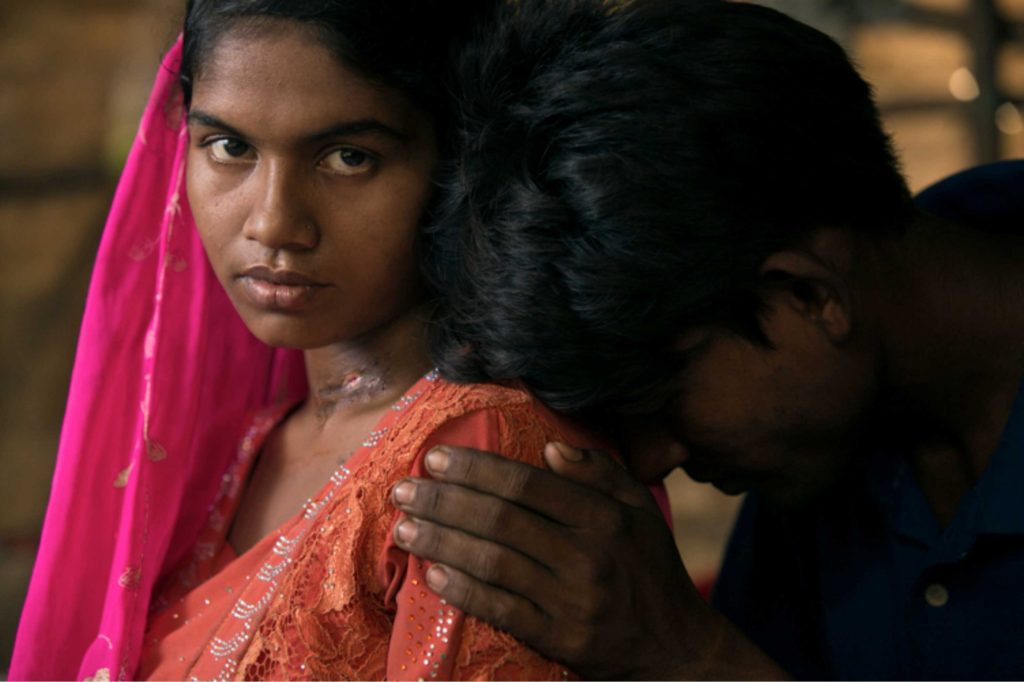
“I am from Dunbai, Myanmar. My husband was a driver, and I was a housewife. We lived a happy life. Two months ago, the military attacked our village. They encircled us, targeting the men. They shot them senselessly, and pried babies from the arms of their crying mothers and cut their heads off. We have two children; a daughter, Asma, four; and a son, Usman Johar, who is two years old. When the military attacked our village, my husband was at the bazaar. My brother was with me at the time, and he took the children. I don’t know what would have happened if he hadn’t. I ran for my life into the forest.
While I was running, the military caught us, and a group of men encircled me. One of them began to cut my throat. I thought this was the end. I started to scream. At that moment, I could see hundreds, maybe thousands of my people who were fleeing, and they were coming in our direction. This scared the military men, and they ran for their lives. I was saved by the grace of God. I started the journey to Bangladesh with the villagers who saved me; we travelled on foot through thick forest. On the third day I was reunited with my husband and children and together we made the journey to Bangladesh. My husband became a beggar on the streets when we reached Bangladesh to raise money to treat my wounds. Our story is not an uncommon one as many others have lost their dear ones.”



